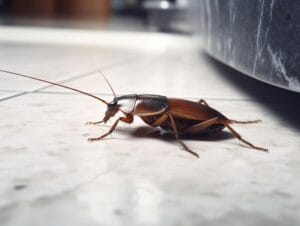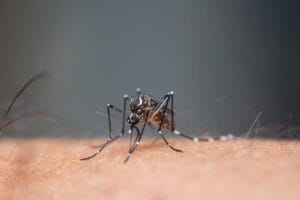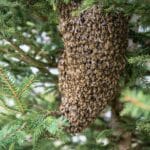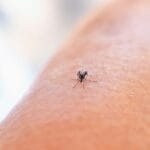Primary Points
- Common household pests such as rodents and insects can carry diseases and cause allergic reactions.
- Termites can cause serious damage to your home, and the cost to repair this damage can be significant.
- Taking preventative measures such as sealing off entrances and maintaining a clean home can help to deter pests.
- If the infestation is serious or persistent, it may be necessary to call in a professional pest control service.
- Regular inspections of your home can help to catch infestations early, reducing the risk of health problems and damage to your property.

Picture this: you’re sitting down to eat dinner and you hear a faint scratching sound coming from inside the walls, or you see something dart out of sight when you turn on the kitchen light. This is more than just a minor annoyance – it’s a sign that household pests have moved in. And they’re not just unwelcome guests – they bring a range of hazards with them.
First and foremost, it’s crucial to realize that these small intruders can have significant effects on our health and homes. Whether it’s the risk of disease from rodents or the asthma attacks caused by cockroach allergens, pests are more than just a nuisance. They’re dangerous.
Introducing Your Unwanted Roommates: A Look into Common Household Pests

Household pests can take many shapes and forms, each presenting their own unique set of problems. Usual suspects include mice, rats, cockroaches, termites, and a range of insects. Some pests, such as mosquitoes, might only be a problem during certain seasons, while others, like bed bugs, can become a nightmare all year round.
Understanding the threat is the first line of defense in protecting your family. For example, rodents are infamous for spreading bacteria and viruses. Insects, conversely, can cause allergies and even induce asthma attacks. And let’s not forget about termites, the quiet destroyers that can weaken the very foundation of your house.
So, keep your eyes open. Make it a habit to check your house for any signs of pests, such as droppings, damage, or nests. In addition, if you hear any strange noises like gnawing or buzzing, it could mean that pests are present.
Spotting the Pests
How can you tell what kind of pest you’re dealing with? You have to look for physical signs. Mice leave behind small, dark droppings, while larger, capsule-shaped ones might indicate rats. Cockroaches, which are known for their ability to survive, leave droppings that look like coffee grounds or black pepper. Termites, which are not as noticeable, shed wings or leave behind their unique mud tubes.
Since these signs may not be glaringly obvious, it’s also crucial to keep an eye out for other signs like damage to your food packaging, fabric, or wood. These signs can often give you an idea of what kind of pest you’re dealing with and how severe the infestation might be.
A buddy of mine once found a pile of sawdust-like material under her wooden bookshelf. She took a closer look and it turned out to be termite droppings—a clear sign of an infestation.
In addition to this, think about any possible entry points. Pests don’t need a lot of space to get into your home—a hole as small as a dime is enough for a mouse, while bugs can get through even smaller cracks. Sealing these entry points is an important step in keeping pests away.
Overview of Health and Property Threats
Why should you worry about a couple of insects or rodents? Because the dangers they present are genuine and diverse. From the illnesses they spread to the allergies they induce, pests can have a substantial effect on our health. Moreover, some pests, such as termites, can actually consume our houses, resulting in structural harm that is costly to repair.
Here’s a quick overview of what these pests can do to your health and home:
- Rats and mice: These critters are known to carry diseases like hantavirus, leptospirosis, and even the plague.
- Cockroaches: The droppings and skin they shed can worsen asthma symptoms, particularly in children.
- Termites: These pests cause more than $5 billion in property damage each year in the U.S. alone.
Considering these dangers, it’s clear that being proactive in preventing and controlling pests isn’t just about comfort—it’s about keeping your home safe.
Household Pests that Can Cause Allergies or Asthma
Ever thought that the reason you can’t stop sneezing, or your child’s asthma seems to be getting worse, could be due to pests in your home? It’s a scary thought, but it’s also a reality. Pests such as cockroaches, dust mites, and even rodents can trigger allergies and worsen asthma symptoms. Their droppings, saliva, and skin that they shed contain proteins that can cause an allergic reaction when inhaled.
How to Manage Allergies Caused by Pests
The first step in managing allergies caused by pests is to reduce exposure. Keep your home clean and free from food scraps that can attract pests. Regularly vacuum your home using a vacuum cleaner with a HEPA filter, and wash your bedding in hot water to kill dust mites. If you’re allergic to stinging insects, exercise caution when you’re outside, especially near flowering plants or trash cans, which can attract these pests.
It’s crucial to keep in mind that if you or a loved one suffers from serious allergies or asthma, having a plan of action is a must. This plan should involve knowledge on how to use medicines such as antihistamines or inhalers and the need to seek immediate medical help if symptoms become severe.
Hidden Home Wreckers: The Price of Overlooking Termites

Termites are the silent assassins of the pest world. They might be doing their damage without you even realizing it. These pests feast on wood, and if they’re feasting on the structure of your house, they can cause major problems. Overlooking termites can come with a hefty price tag, as they can weaken the structure of your house, resulting in costly repairs.
Termites love damp environments, so it’s crucial to keep water from pooling near your home’s foundation. Make sure your gutters and downspouts are free of debris and that they’re diverting water away from your home. Regularly check wooden structures for damage and look for signs of termites, such as mud tubes or wood that sounds hollow when you knock on it.
But the cost isn’t the only problem. If you’re living in a house that’s been damaged by termites, you could be in danger. You might fall through a floor, or a ceiling could come down on you – it’s a risk you can’t afford to take.
Recognizing the Silent Damage Early
Imagine a family who found termite damage while remodeling their bathroom. They saw some discolored drywall and, after a closer look, they found extensive termite damage that had been overlooked for years, costing them thousands in repairs.
To detect termites early, watch for discarded wings near windows or doors, as termites shed their wings when they swarm to start new colonies. Also, be aware of any wood that sounds hollow when you tap it or if you find small piles of what appears to be sawdust, which could actually be termite droppings.
Having a professional regularly inspect your home can help you catch termites before they cause irreversible harm. It’s an investment that could spare you not only money, but also the distress of watching your home get damaged.
How to Stop Termites: Proven Methods
Preventing termites can feel like a big task, but it’s manageable if you know what to do. First, get rid of what they eat—don’t store firewood, lumber, or paper near the base of your house. Seal any cracks or small openings on the outside of your house to keep termites from getting in. And above all, keep the area around your house dry, because termites like places that are damp.
Home Sweet Home: Keeping Unwanted Critters Out

Your home is your castle, not a breeding ground for pests. The most effective way to keep pests out is to stop them from getting in to begin with. This involves taking the initiative to close up any possible entryways and making your home less appealing to pests.
Shut it Down: Blocking Entry Points
Have a good look around your house, as if you were a sleuth on the hunt. Keep an eye out for any cracks in the base, any spaces around windows or doors, and even small holes where utility lines come into your house. Use caulk, steel wool, or other suitable materials to seal these points and keep pests out.
Natural Methods for Pest Control
Chemical solutions aren’t the only way to keep pests at bay. Basic practices like keeping your kitchen clean, taking out the trash regularly, and storing food in sealed containers can have a major impact. Plus, natural repellents like peppermint oil for mice or diatomaceous earth for bugs can be both effective and safe for your family and pets.
One more useful trick is to attract natural predators to your garden. Birds, for instance, can assist in regulating the number of insects. Placing a bird feeder or birdhouse in your garden can make it more appealing to these beneficial animals.
Knowing When It’s Time to Call Pest Control Professionals

No matter how hard you try, there are times when pests simply refuse to leave. That’s when it’s time to bring in the professionals. Pest control professionals can provide solutions that are not only effective, but are also designed to deal with your particular situation and the specific pests you are dealing with.
Determining when it’s time to bring in a professional can be pretty easy. If you’ve tried to get rid of the pests yourself and haven’t had any luck, if the infestation is all over, or if the pests could seriously harm your health, you should reach out to the professionals.
Selecting the appropriate pest control solution for your home is crucial. Search for well-established firms with positive customer feedback and inquire about their procedures. Make sure they use treatments that are harmless to your loved ones and pets. Don’t be shy to ask questions—after all, it’s your home, and you’re entitled to know precisely how they intend to safeguard it.
Ultimately, the aim is simple: to keep your home a safe, pest-free zone for your loved ones. By staying educated, taking action, and understanding when to call in the pros, you can keep these unwelcome visitors away for good.
When thinking about protecting your family from household pests, it’s not just about laying down traps or spraying bug killer. It’s about making smart choices that put your health and safety first. This is where professional pest control services can really help, providing knowledge and solutions that you couldn’t manage on your own.
Selecting the Best Pest Control Service for Your Residence
Selecting the most suitable pest control service is an important choice. You need a service that comprehends the distinct difficulties of your circumstance and delivers strategies that are efficient, harmless, and long-lasting. Search for businesses with certified professionals, a history of accomplishment, and a dedication to educating their customers. They should be open to discussing their techniques and items, making sure they’re harmless for your household and pets.
Commonly Asked Questions

When it comes to dealing with pests in your home, it’s normal to have questions. Here are answers to some of the most frequently asked questions to help you keep your home safe.
How frequently should I check my house for pests?
Consistent checks are your primary protection against the invasion of pests. As a general guideline, check your house every season—four times annually. This will help identify any new access points that may have formed and any indications of pest activity before they escalate into a bigger issue.
Can I safely handle pest control myself?
Yes, you can. There are several safe and effective methods you can use to prevent and control pests yourself. These methods include using natural repellents like essential oils for insects or ultrasonic devices for rodents, and keeping a clean and clutter-free home to eliminate food sources and hiding places for pests.
- Block any crevices or gaps that could be used as entry points.
- Make sure your home is tidy, particularly in terms of food scraps.
- Use natural pest repellents such as peppermint oil or citronella.
- Set up traps and baits in key locations, making sure they are inaccessible to children and pets.
However, for more serious infestations or when dealing with particularly harmful pests, it is advised to use professional pest control services.
What are the indications of a major pest problem?
Major pest problems often leave obvious indications. These might be a large number of live or dead pests, significant damage to food packaging or structures, and strong, lingering smells. You might also notice a rise in allergy symptoms or see pests in the open during the day when they usually stay hidden. For more information, check out these pest-proofing secrets and tips from the experts.
Do pests lead to ongoing health conditions?
Indeed, pests can lead to ongoing health conditions, particularly when infestations are not adequately addressed. Ongoing exposure to allergens from pests can result in chronic respiratory conditions, and some pests can spread diseases that have long-term health implications.
For example, a research piece in the Journal of Allergy and Clinical Immunology discovered that children exposed to cockroach allergens have a higher chance of developing asthma.
Hence, it’s crucial to tackle pest issues immediately and comprehensively to safeguard your family’s health.
Should pests be a concern if I have pets or kids?
Indeed, pets and kids are especially susceptible to the threats posed by household pests. Pets may be plagued by fleas and ticks, leading to discomfort and illness. Kids, due to their still-developing immune systems, are more prone to the allergens and toxins that pests can bring into the home.
It’s important to use pest control measures that are safe for everyone in your household. If you’re unsure, it’s always a good idea to consult with a professional to make sure the measures you’re taking are both effective and safe for your family.
To sum up, the covert threats posed by domestic pests are genuine and complex, impacting both health and property. By recognizing these hazards, taking proactive steps, and knowing when to enlist the help of experts, you can keep your home safe and cozy. Bear in mind, the secret to successful pest control is vigilance, awareness, and initiative. Your home is your haven; keep it safeguarded.
Your input is empty. Please provide the content to be rewritten.





